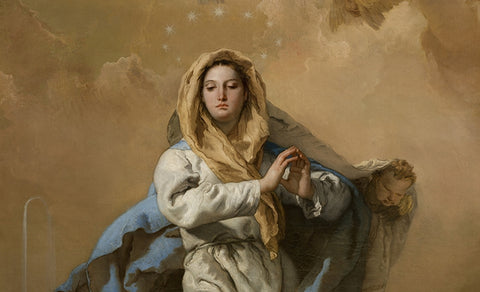On December 8, the Catholic Church celebrates the great feast of the Immaculate Conception of Mary.
The Immaculate Conception is one of the most important dogmas of Catholicism. It states that Mary, the mother of Jesus, was conceived without original sin. This means that from the moment she was conceived in her mother's womb, she was free from sin and subject to no corruption. This belief has been held by Catholics for centuries and is an essential part of Catholic teaching. Let’s take a look at what this dogma means and why it is so important to Catholics.
The Origins of The Dogma
The belief that Mary was born without original sin can be traced back centuries to early Church Fathers such as Irenaeus, Origen, Ambrose, Augustine, and Gregory Nazianzus. While their writings did not explicitly mention Mary’s Immaculate Conception, they wrote about her preeminent holiness and purity—which implies her conception must have been free from sin.
In 1854, Pope Pius IX defined this doctrine as an article of faith in his papal bull Ineffabilis Deus (Latin for “Ineffable God”). This marked the first time a pope officially declared the dogma of the Immaculate Conception as binding on all Catholics worldwide. Since then, it has become one of the most important beliefs for Catholics everywhere.
The Significance of The Dogma
The belief in Mary’s immaculate conception is significant for several reasons. First, it serves as a reminder that human beings are capable of living lives that are completely devoted to God despite our imperfections and failings. It also serves as a reminder that we should strive to be like Mary—pure in spirit and devoted to our faith—in order to live meaningful lives according to God’s will. Finally, it reminds us that we should never give up hope; even if our sins seem too great or too numerous to be forgiven by God, He will always find a way to forgive us if we sincerely repent and turn away from our sins with humility and faithfulness in His love.
In summary, understanding the dogma of the immaculate conception is essential for Catholics seeking greater knowledge about their faith. By understanding this doctrine and accepting its truthfulness with humility and faithfulness towards God's love, we can remember that each one of us has inherent value no matter how many times we stray from God's will or make mistakes in life—and also gain insight into how we can live our own lives more faithfully according to His teachings by following Mary's example of devotion and purity throughout her life on Earth. As Pope Pius IX said when he declared this doctrine official church teaching in 1854: “Let all people understand clearly...that [Mary] through the grace of almighty God had been preserved exempt from all stain of original sin." We should take these words to heart and strive every day to emulate her example so that we may lead more virtuous lives inspired by her holiness.

